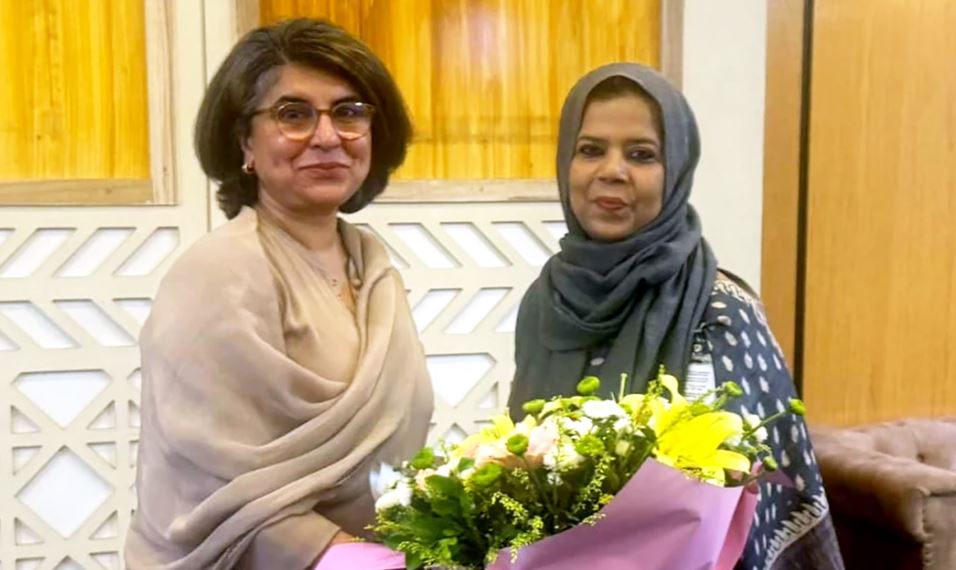Diplomatic ties between Bangladesh and Pakistan — long strained by the bitter legacy of the 1971 Liberation War — have entered a phase of renewed engagement following the rise of an interim administration in Dhaka.
The last year’s political upheaval, which led to the ouster of former prime minister Sheikh Hasina amid mass uprising, has prompted a realignment of Bangladesh’s foreign policy. One of the most notable shifts is a thaw in relations with Pakistan.
Under the leadership of Nobel laureate Muhammad Yunus, who now heads the interim government, bilateral diplomacy has gained significant momentum.
In a development, Pakistani Foreign Secretary Amina Baloch is currently in Dhaka for talks with her Bangladeshi counterpart Jasim Uddin, marking the first high-level engagement between the two countries in over 15 years.
This meeting follows a prolonged diplomatic freeze during Hasina’s tenure, which had begun in 2009 and was marked by heightened tensions.
Bangladesh’s war crimes tribunal, launched in 2010, led to the execution of several top leaders of Jamaat-e-Islami, a party with historic ties to Pakistan. Islamabad had publicly expressed its disapproval, worsening the already strained relations.
On Thursday, the two foreign secretaries are expected to meet with plans underway for a follow-up visit by Pakistani Foreign Minister Ishaq Dar, who is likely to meet Bangladesh’s Foreign Affairs Adviser Touhid Hossain later this month.
Since the change in leadership in Dhaka, bilateral cooperation has accelerated.
In February, the two countries resumed direct trade, approved a Dhaka-Karachi flight route, eased visa procedures, and revived military contacts. Reports of security and intelligence collaboration have also emerged.
For decades, bilateral relations were dominated by the trauma of 1971, when Bangladesh fought for independence from Pakistan.
Bangladesh estimates that 3 million people were killed and over 200,000 women were raped during the nine-month war. The conflict ended with the surrender of more than 90,000 Pakistani troops and civilians to Indian and Bangladeshi forces.
Dhaka has continued to demand a formal apology from Islamabad — an overture Pakistan has yet to offer.
Analysts suggest the latest diplomatic shift is rooted in broader strategic recalculations.
Md. Abdul Mannan, professor of international relations at the University of Dhaka, told Times of Bangladesh that while the renewed talks may appear commercially motivated, they carry deeper strategic significance.
“During the Awami League’s rule, close ties with Pakistan were impossible due to the party’s deep commitment to the Liberation War legacy,” Mannan explained.
“But the current administration seems more inclined to align with nations that can serve as a counterbalance to India.”
He added that Pakistan, too, is eager to seize this opportunity to strengthen its influence in South Asia.
“Naturally, Islamabad would want to deepen ties with Bangladesh and subtly foster anti-India sentiment,” Mannan said.
Recent months have seen Yunus and Pakistani Prime Minister Shehbaz Sharif meet several times at sideline of international forums.
Military relations have also seen a notable revival, like, in January, a high-level Bangladeshi military delegation visited Islamabad for talks with Pakistan’s Army Chief General Syed Asim Munir.
The Bangladesh Navy also joined a multinational maritime exercise hosted by Pakistan off Karachi’s coast in February.
That same month, Bangladesh imported 50,000 tonnes of rice from Pakistan—marking the first direct trade in decades. Pakistani cargo ships have also resumed regular visits to Bangladeshi ports.
While there is no fixed agenda for the current diplomatic talks, a Bangladeshi foreign ministry official told state-run BSS news outlet that the discussions would cover a wide range of topics.
“After such a long hiatus, it’s difficult to prioritize in advance, but the talks will be comprehensive,” the official noted.
Bangladesh’s High Commissioner to Pakistan, Md Iqbal Hussain Khan, confirmed Islamabad’s strong desire to expand trade ties.
He said that, alongside Fly Jinnah, which has been cleared to operate flights between Karachi and Dhaka, another Pakistani carrier, Air Sial, has applied for flight approvals from Bangladesh’s Civil Aviation Authority.
Officials from both countries believe the renewed air links could significantly boost tourism and people-to-people connectivity, turning a once – hostile relationship into a pragmatic and forward-looking partnership.
Dhaka-Islamabad ties at high tide after decades of estrangement

Leave a comment

